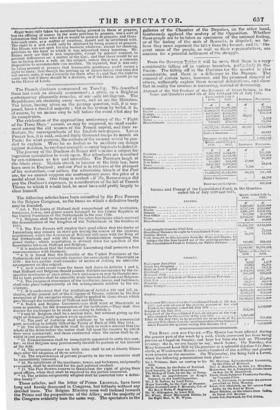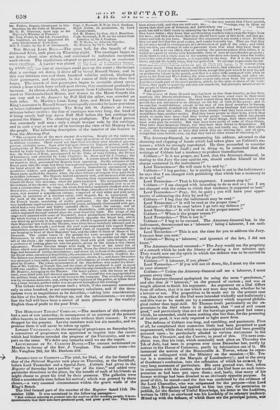-TrrE ICING AND HIS Cos; isr.-The Queen has been affected
during the greater part of the week by a cold, svhich prevented her from being present at Chapel on Sunday, and kept her from the ball on Thursday evening: she is, we are happy to say, much better. On Tnesda.f., the King honoured Lord Hill by his presence at a splendid dejeliner a la fourdette, at Westbourne House : twelve hundred of the nobility and gentry were present on the occasion. On Wednesday, the King held a Levee,
when the following presentations took place Sin. Williams, Bad, on coming to his Mr. Hartopp, Leicestershire Yeomanry; title, by the Ditke of Rutland. Sir R. Sutton, by the Duke of Rutland. Rev. A. Hamilton, by Gen. Ld. Howden. Lord Dunally, by Lord Hatvarden. Major-Gen. Sir A. Campbell, to take leave The Bishop of Cork, by the Bp. of Ferns. on dep. for N. Brunswick. Mr. Halt, on appointment as King's Lieut. Scott,Salopian Yeomanry Cavalry, Counsel, by the Lord Chancellor. by Viscount Clive. Mr. J. H. Bolton, by Lord Foley. Rev. 13. Robinson, to present the sermon Major Norcliffe, by the Earl of Munster. preached on Trin. Monday. Major-General Count F. Rivarola, Col. of Lieut.-Col. Shnbrick, on his return fro= the Royal Malta F. Regiment. India, by the Earl of Errol. • Mr. W. Sillingston, by Lord Hill. Major Ritchie, on his return from Indio. Mr. Wynn, Royal Merionetb Militia, by by Lieut.-Col. Bowler. the Right Hon. C. W. Wynn. Lieut.-Col. Gurwood, by Col. Gibbs.. Mr. Forbes, Deputy-Lieutenant in Stir. Capt. J. Boswell, R.N. by Sir J. Graham. tinsshire, by tile Duke of Montrose. Major Irvine, on promotion, by Lord Mr. G. H. Seymour, upon app. as his Cotnbermere, Majesty's Minister at Florence. Col. K. Money, by Gen. Sin. Hamilton. Mr. Serg. Peake, by the Ld. Chancellor. Capt. Ayscough, R.N. on his return from Mr. Gardiner, on being appointed De Jamaica, by Sir J. Graham.
puty-Lieutenaut of Yorkshire. Mr. T. Rowe, by Admiral Dundas. Rev. T. Cooke, by the E. of Dartmouth. Dr. fluency, by Sir C. Imhoff.
Tun Dainty LANE BALL.—The great ball, for the benefit of the distressed Irish, took place on Thursday night. The carriages began to set down about nine o'clock, and continued in unbroken succession until eleven. The regulations adopted to prevent jostling or confusion lvrt t.•=11er.t. A harrier was placed at -ttz 4":
by Wilich.iy 'me line of carriages could pass up the street ; the instant that a carriage set down, it drove off by Great Russell Street, and in this way between two and three hundred vehicles arrived, discharged their passengers, and departed, in the course of little more than two hours. The crowds of foot passengers began to assemble about seven
o'clock ; from which hour to half-past eleven' they continued gradually to increase. At eleven o'clock, the pavement from Catherine Street westward to Northumberland House, and thence to the Horse Guards the one way and to St. James's by Pall Mall the other, was crowded on
both sides. St. Martin's Lane, Long Acre, and Drury Lane to the King's entrance in Russell Street, were equally crowded by more provident or better-informed spectators. The King left St. James's at twenty minutes before twelve : the line of carriages was very long, the head of it being nearly half way down Pall Mall before the last carriage had quitted the Palace. The cheering was prodigious. The Royal person was extremely well seen : only a single trooper rode by the carriage, and in such a way as not at all to intercept the view of his Majesty from the people. The following description of the interior of the theatre is
from the Morning Post. "The company was of the most elegant description. Nearly all the ladies appeared in Court dresses and plurne.:, and a large proportion of the gentlemen were in military costume. There could not have been less than nine hundred persons present, probably more. Soon after half-past eleven his Majesty arrived, with the Landgravine of Hesse Homberg, and the Duke and Duchess of Cumberland, attended by Lady Sophia Lennox, Miss Cooper, Baron Linsingen, and Colonel Paten ; the Duchess of Kent, accompanied by the Duke of Saxe Coburg, the Prince of Leiningen, and attended by Lady Charlotte St. Biala and Sir .1.Conroy ; the Duchess of Kent, attended by Baroness Ahlefelt. A severe attack of the influenza, we regret to hear, prevented her Majesty from appearing. On the entrance of the Royal party into the stage .box there was a general applause from the company, and the band played the natioaal anthem. Dancing immediately commenced with quadrilles, waltzes, and gallopades: At a (muter past one his Majesty and the Royal party quitted the theatre, when the same tributes of respect were paid them as on their entrance. His Majesty looked extremely well, and returned with much affability the recognitions of the company. Dancing then recommenced, and continued till three this morning, when the party separated. The arrangements and decorations of the theatre were very effective. The .pit was boarded over so as to form a continuation of the stage, the whole floor befog tastefully chalked with the Royal arms, crowns, &c. Immediately over the stage extendi ngas far as the proscenium, was erected a magnificent canopy, composed of rich white and pink satin striped, in imitation of ,a Grecian camp, with drapery. Lke. to correspond. At the back of the tent was built a grand orchestra, containing Weippert's and the French bands, consisting of eighty professors. On the orchestra was a very handsome regal coronet, encircled with laurel, brilliantly illuminated with gas, which had a very novel and highly splendid effect. Under the canopy, and on either aide, were four superb Grecian metal chandeliers, with eight burners each, which imparted through stained glass the most beautiful light. The wings of the stage were adorned with some of Stanfield's finest productions in marine painting, the whole having a very fine effect. Immediately opposite the Royal box, which was fitted up precisely in the same manner in which it appeared °tithe occasion of their Majesties last visit to the theatre, were three boxes tastefully adorned, and in which were the Stewards ' • and from the roof were suspended two Superb Roman chandeliers, composed of brass and burnished steel, of exquisite workmanship— one banging in front of their Majesties' box, and the other in front of those of the Stewards. The centre boxes of the ground tier were occupied by the Lady Patronesses, to which access was had by staircases in the middle and right and left of the circle ; the interior was tastefully lined with pink satin drapery, with a profusion of looking-glass let into the panels, giving to the whole a very chaste appearance. Twelve Grecian lamps were bung in front of the lower tier of boxes, which were prettily festooned with laurel. From the third tier were exhibited flags and banners of various descriptions; and above all, in front of the gallery, were the Royal arms, carved and beautifully is ilt,ornamented with banners, trophies, &c. The Saloon was decorated with exotics, evergreens, shrubs, &c., and down the centre was arranged a long table, well stored with refreshments of every description, supplied by Gunter. The whole arrangement of the ehandeliers was under the direction of Mr. Collins, of Temple Bar, and the glare of light produced is said to equal &000 wax candles. The decorations were under the superintendence of Mr. Nall and Mr. Blamire, belonging to the Theatre. 'lice lower gallery, with the boxes on that level, were tilled with well-dressed spectators. The second tier was appropriated to the military band, and the rest of the boxes to the company. The crowding without was by no means excessive, and, owing to the vigilance of the malice, of whom there was a large muster, perfect 'order was preserved throughout the evening."
The tickets were two guineas each ; which, if the company amounted only to nine hundred, as our contemporary calculates, and if the decorations were so magnificent as he describes,—taking into consideration the hire of the house, the fittings up, and the refreshments,—we much fear the ball will have been a source of more pleasure to the wealthy English than of profit to the poor Irish.

























 Previous page
Previous page